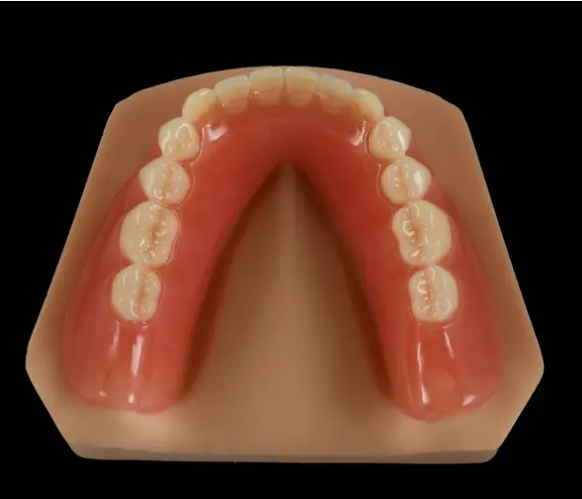A full acrylic denture is a removable dental appliance meticulously crafted to replace an entire set of missing teeth. Made primarily from acrylic resin, this type of denture is known for its affordability, lightweight nature, and adaptability to oral contours. Full acrylic dentures are widely favored by patients and dentists alike for their functionality and aesthetic appeal, effectively restoring not just one's smile but also the vital functions of chewing and speaking.

The process of creating an acrylic full denture is intricate and involves several steps to ensure a perfect fit and natural appearance. Here's a step-by-step breakdown:
1. Initial Consultation and Impressions: The first step involves a consultation with a dentist, during which impressions of the patient's gums and any existing teeth are taken. This helps in creating a precise model of the mouth.
2. Wax Model Creation: Using the impressions, a preliminary wax model of the dentures is made. This model is tried in the patient's mouth to assess the fit and function before the final denture is fabricated.
3. Customization: Adjustments are made based on the trial fitting. The dentist and patient work together to choose the appropriate tooth shape, size, and color to match the patient's natural teeth.
4. Acrylic Processing: The final denture is crafted from high-quality acrylic resin. This involves pouring the acrylic into molds and then curing it to harden the material.
5. Finishing Touches: Once the acrylic has set, the denture is polished to ensure a natural look and comfortable fit.
6. Final Fitting and Adjustments: The final step involves fitting the denture in the patient's mouth and making any last-minute adjustments to ensure optimal comfort and function.
1. Cost-Effective:
Acrylic full dentures are generally more affordable compared to other removable dentures types such as those made from metal or flexible materials.
2. Aesthetically Pleasing:
The material's excellent color-matching capabilities allow for a natural-looking set of teeth that closely resemble natural gums and teeth.
3. Lightweight:
Acrylic resin is lightweight, which makes the dentures more comfortable for the user, especially when compared to heavier materials like metal.
4. Easy to Adjust and Repair:
Due to the nature of the material, acrylic dentures can be easily adjusted and repaired if needed. This makes maintenance straightforward and cost-effective.
1. Durability:
While acrylic full dentures are sturdy, they are not as durable as metal-based dentures. They can be more susceptible to breaks and cracks.
2. Porous Nature:
Acrylic can be porous, making it difficult to clean thoroughly. This can sometimes lead to bacterial buildup if not properly maintained.
3. Potential for Allergic Reactions:
Some patients may experience allergic reactions to the acrylic resin, though this is relatively rare.
4. Absorption of Odors:
The porous nature of acrylic can also lead to the absorption of odors over time, necessitating frequent cleaning.
The lifespan of an acrylic full denture largely depends on the care and maintenance it receives. On average, these dentures last between 5-7 years. However, several factors can influence this lifespan:
1. Oral Hygiene: Proper cleaning and oral hygiene practices can significantly extend the life of an acrylic denture. It's crucial to follow the dentist's guidelines on daily cleaning routines.
2. Regular Check-Ups: Regular dental check-ups allow for early detection of any issues and timely adjustments, ensuring the denture remains in good condition.
3. Quality of Material: Higher-quality acrylic materials can enhance the durability and longevity of the dentures.
4. Wear and Tear: Regular wear and the impact of biting and chewing can eventually wear down the denture. Being mindful and avoiding overly hard or sticky foods can help prolong its life.
5. Proper Storage: When not in use, storing dentures in water or a denture solution can prevent them from drying out and cracking, further extending their longevity.
An acrylic full denture from golden smile dental lab is a practical and cost-effective solution for those who have lost all their teeth in one or both jaws. While they come with their disadvantages, such as a propensity to break and potential difficulty in cleaning, their benefits in terms of cost, aesthetics, and ease of adjustment and repair make them a popular choice. With proper care and regular dental visits, an acrylic full denture can significantly improve one's quality of life, restoring both function and appearance to their fullest.